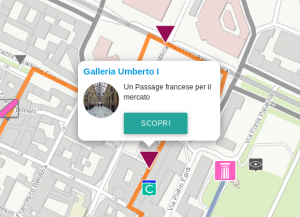Help: POI

Imagine the "'POI'" as an illustrated book. The story is composed of photos and videos with short captions.
The pages of this book— the Media and the News—must be sorted by Chapters (Context, History, Stories, etc.) to have an interesting and structured narration.
Fields
Name
Name of the POI as it will be shown on Atlas.
Category
The POI is represented on the atlas by a specific icon for each Category.
Balloon image
Small thumbnail image of the POI.
The image must be edited with a graphics software (GIMP, Paint, PhotoShop, etc.) before adding it, reducing it to 90x90px with 72dpi resolution and a maximum size of 5 KB.
Balloon text
Short preview description of the POI.
Suggested length 50-100 digits spaces included, up to a maximum of 255 digits.
Position
Geo-localization system of the POI, clicking on an expandable map.
The map can be easily centered by typing an address, after typing the name of the Municipality in the dedicated field.
Coordinates
If you are looking for the manual coordinates input, you should know that this function is only shown to advanced users
Description and links
Description of POI key aspects: fundamental historical elements, events, specific uses, etc.
Suggested length 300 digits spaces included. Maximum 600 digits.
Languages Botton
To add the description in other languages: by now possible in English, French, Chinese.
Linked POI
Insertion of potential linked POI, by digiting their name. For example POI of the same itinerary, or the same place like different buildings on the same square. The operation is facilitated by the suggestion of existing POI when you start to digit a name.
Add Tag
Insertion of some keywords to characterize the element and eventually link it to others. The operation is facilitated by the suggestion of existing Tag when you start to digit a name, but you can also create new ones.
External links
Insert the url of web pages which deepen the argument or with linked themes.
You can create an automatic link copying the URL of the website followed by a space and a title. The title will be the only visible writing from the users' side, to obtain greater clarity.
For example:
To obtain:
Further explanations on Museo Torino
You should write:
http://www.museotorino.it/site/exhibitions/history/room/1 Further explanations on Museo Torino
Archives
Non-expert users should maintain default values.
An ensemble of POI which refers to a specific theme. You should always choose according to affiliated groups if it is not already defined on the registration phase.
Advanced Options
Save as
- Draft
- elaboration still not complete, available for user or group modification.Important: draft are visible under List, NOT on Atlas.
- Ready
- elaboration complete, available for modification on the basis of group permission. They are visible both on List and on Atlas.
Types of visualization
- Media in chapters
- shows Media contents divided in Chapters' shelves (News, Presentation, Context, Places, History, Architecture, Projects, Events, Details, Stories, Extra material).
- United Media
- to show contents in a slideshow (not in shelves).
Group Permissions
Choice of users who can see or modify the POI that is Ready.
Personal Notes
Space for personal notes, as a reminder or to share ideas with the members of the working group.
Review
Space reserved to the AtlasFor Staff. It is used to indicate to operators eventual corrections or insights, necessary for the publication of the POI.
Permits
<translate> In seguito i permessi utente che regolano alcune funzionalità rilevanti:</translate>
| <translate> Azione</translate> | <translate> Permesso</translate> | <translate> Ruoli</translate> |
|---|---|---|
| add a private POI | add_poi_private |
verifica |
| add a public POI | add_poi |
verifica |
| modify all the POI | edit_all_poi |
verifica |
Maggiori informazioni nella tabella dei ruoli e permessi AtlasFor.
Related pages
- atlas:poi-edit.php – Add POI
- atlas:poi-list.php – POI List